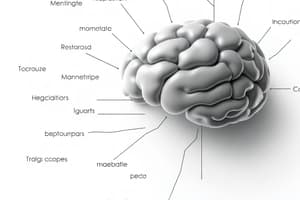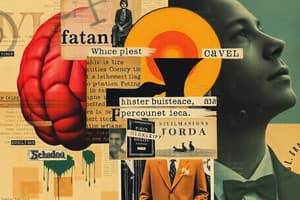Podcast
Questions and Answers
What is psychology?
What is psychology?
- The study of behavior and the mental processes (correct)
- The study of only behavior
- The study of physical health
- The study of mental processes only
What does dualism refer to?
What does dualism refer to?
Divides everything into body and spirit
Who believed that mind and body interact?
Who believed that mind and body interact?
René Descartes
What is the pineal gland according to Descartes?
What is the pineal gland according to Descartes?
Who started empiricism?
Who started empiricism?
What does empiricism mean?
What does empiricism mean?
Who started materialism?
Who started materialism?
What is materialism?
What is materialism?
Who started evolutionary theory?
Who started evolutionary theory?
Who is considered the founder of the science of psychology?
Who is considered the founder of the science of psychology?
Who started structuralism?
Who started structuralism?
What is structuralism concerned with?
What is structuralism concerned with?
What does functionalism focus on?
What does functionalism focus on?
What is biological psychology?
What is biological psychology?
What studies observable behavior?
What studies observable behavior?
What is classical conditioning?
What is classical conditioning?
Who started classical conditioning?
Who started classical conditioning?
Who applied classical conditioning to humans in Little Albert?
Who applied classical conditioning to humans in Little Albert?
Who started operant conditioning?
Who started operant conditioning?
What is operant conditioning?
What is operant conditioning?
What is behavior modification?
What is behavior modification?
What does cognitive psychology emphasize?
What does cognitive psychology emphasize?
What does humanistic psychology study?
What does humanistic psychology study?
Who started self-actualization?
Who started self-actualization?
What is self-actualization?
What is self-actualization?
Who started psychoanalytic theory?
Who started psychoanalytic theory?
What does psychoanalytic theory distinguish?
What does psychoanalytic theory distinguish?
What concerns cultural values?
What concerns cultural values?
What does evolutionary psychology consider?
What does evolutionary psychology consider?
What is behavioral genetics?
What is behavioral genetics?
What unites the areas of neuroscience and clinical psychology?
What unites the areas of neuroscience and clinical psychology?
What does experimental psychology study?
What does experimental psychology study?
What does developmental psychology study?
What does developmental psychology study?
What does personality psychology examine?
What does personality psychology examine?
What does health psychology explore?
What does health psychology explore?
What does clinical psychology investigate?
What does clinical psychology investigate?
What does social psychology study?
What does social psychology study?
What does cross-cultural psychology focus on?
What does cross-cultural psychology focus on?
What is phrenology?
What is phrenology?
What is a Master's Degree in the context of psychology?
What is a Master's Degree in the context of psychology?
What is a psychiatrist?
What is a psychiatrist?
Flashcards are hidden until you start studying
Study Notes
Key Concepts in Psychology
- Psychology: The scientific study of behavior and mental processes, encompassing both observable actions and internal activities.
- Behavior: Refers to observable actions of individuals and animals, providing a basis for psychological assessment.
- Dualism: The philosophical belief that divides existence into two distinct entities: body and spirit.
Influential Figures and Theories
- René Descartes: Proposed the interaction between mind and body, suggesting the pineal gland as the interaction point.
- John Locke: Initiated empiricism, emphasizing truth gained through observeable experiences.
- Thomas Hobbes: Introduced materialism, asserting that only matter and energy exist.
- Charles Darwin: Founded evolutionary theory, impacting understanding of psychological development.
Foundations of Psychological Science
- Wilhelm Wundt: Credited as the founder of psychology as a formal discipline, establishing the first psychological laboratory.
- Edward Titchener: Originated structuralism, focusing on the structure and components of the mind.
- Functionalism: Emphasizes the purpose of mental processes in adaptation to the environment.
Branches of Psychology
- Biological Psychology: Explores relationships between biological processes and behaviors.
- Behavioral Psychology: Focuses on observable behavior, steering away from internal mental states.
- Cognitive Psychology: Investigates higher mental processes, understanding behavior through cognitive functions.
- Humanistic Psychology: Highlights consciousness and free will, investigating the human experience.
- Sociocultural Psychology: Examines the influence of cultural values on behavior and mental processes.
- Evolutionary Psychology: Analyzes how evolution and genetics influence behavior.
- Behavioral Genetics: Studies genetic influences on behavior, linking biology and psychology.
- Clinical Neuropsychology: Merges neuroscience with clinical psychology, focusing on biological origins of disorders.
Learning Theories
- Classical Conditioning: A learning process where an organism learns to associate a neutral stimulus with a significant one (Ivan Pavlov was pivotal in this development).
- Operant Conditioning: A behavior modification approach where behavior is shaped by environmental outcomes (initiated by B.F. Skinner).
Psychological Applications
- Behavior Modification: Techniques aimed at altering behavior based on learned habits.
- Developmental Psychology: Studies behavioral changes throughout life, from conception to old age.
- Health Psychology: Investigates the interaction between psychological factors and physical health.
- Clinical Psychology: Focuses on the diagnosis and treatment of psychological disorders.
- Social Psychology: Explores how individuals are influenced by social interactions.
Concepts in Specialized Psychology
- Cross-Cultural Psychology: Highlights differences and similarities in psychological functioning across various cultures.
- Phrenology: Early theory suggesting that different areas of the brain correspond to specific mental functions, leading to the idea of localization.
Educational Pathways
- Master's Degree: Important for certain professional paths in psychology; specific regulations may limit autonomy in prescribing medication.
- Psychiatrist: A medical doctor specializing in mental health, capable of diagnosing and treating psychological disorders.
Notable Theorists
- Abraham Maslow: Known for his theory of self-actualization, outlining the desire for individuals to achieve their fullest potential.
- Sigmund Freud: Innovated psychoanalytic theory, emphasizing the distinction between conscious and unconscious processes.
Studying That Suits You
Use AI to generate personalized quizzes and flashcards to suit your learning preferences.




